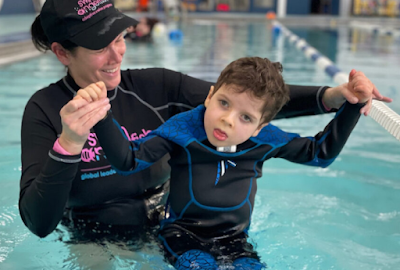Understanding Traumatic Brain Injury (TBI)
Traumatic Brain Injury, or TBI, shatters the familiar landscape of one's world, leaving behind a trail of challenges that demand resilience and adaptation. This condition, arising from trauma to the brain, disrupts essential functions, encompassing cognition, emotion, sensory perception, vision, and physical abilities.
 |
| Aquatic Therapy For TPI |
The Multifaceted Challenges of TBI
- Cognitive Effects: Altered memory, attention, processing speed, and executive function.
- Emotional Turmoil: Difficulty in emotion regulation, personality changes, and mood disorders.
- Motor Impairments: Disruptions in balance, coordination, and movement.
- Sensory Dysfunction: Heightened sensitivities and processing difficulties with stimuli.
The Therapeutic Power of Water
Harnessing the therapeutic properties of water opens new avenues for TBI recovery, offering a sanctuary where challenges transform into opportunities for growth.
Aquatic Therapy: A Healing Oasis
Aquatic therapy emerges as a beacon of hope for individuals navigating the tumultuous waters of TBI recovery. This innovative approach integrates the benefits of water with targeted interventions, providing holistic support for rehabilitation.
Benefits of Aquatic Therapy for TBI
- Relief from Spasticity: Water's buoyancy aids in relaxing tight muscles, facilitating improved range of motion.
- Enhanced Balance and Coordination: Submerged in water, individuals find stability and confidence, honing essential motor skills.
- Strength and Endurance: The resistance of water fosters muscle strength and endurance, vital for functional independence.
- Gait Improvement: Through aquatic exercises, individuals refine their gait patterns, paving the way for smoother mobility.
- Promotion of Self-Regulation: The serene environment of the water promotes emotional balance and self-regulation, key components of holistic recovery.
Ben's Journey: A Testament to Aquatic Therapy's Efficacy
Meet Ben, a resilient 6-year-old whose journey exemplifies the transformative power of aquatic therapy. Through tailored interventions and specialized equipment, Ben discovers newfound strength, resilience, and joy amidst the waves.
Unlocking Independence with Adaptive Swim Lessons
Adaptive swim lessons serve as a gateway to independence, empowering individuals with TBI to navigate the waters with confidence and grace.
Benefits of Adaptive Swimming for TBI
- Independent Mobility: Adaptive swim lessons equip individuals to traverse the water independently, fostering a sense of freedom and autonomy.
- Enhanced Coordination: Through synchronized movements, individuals refine their coordination and balance, honing essential motor skills.
- Social and Emotional Growth: Engaging in aquatic activities cultivates social connections and boosts confidence, enhancing overall well-being.
- Lifelong Engagement: Adaptive swimming nurtures a lifelong affinity for aquatic pursuits, enriching lives beyond the confines of TBI recovery.
Conclusion: Embracing a Brighter Future
In the realm of TBI recovery, the therapeutic embrace of water offers solace, healing, and limitless potential. Through aquatic therapy and adaptive swim lessons, individuals with TBI embark on a transformative journey towards independence, resilience, and joy. Together, we navigate the currents of adversity, emerging stronger, wiser, and united in our pursuit of a brighter future.
Enjoy
Richard








No comments:
Post a Comment